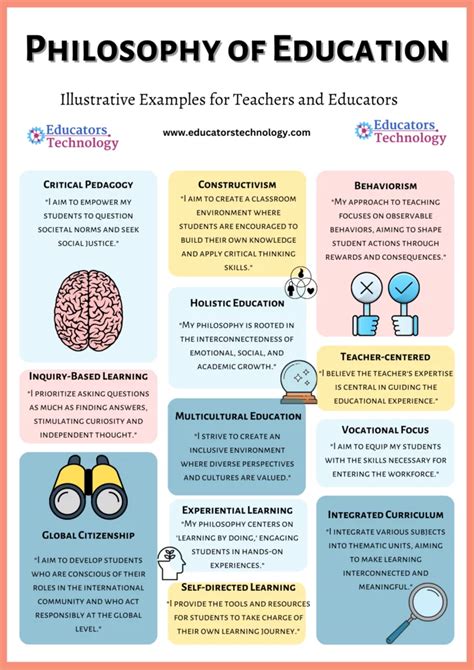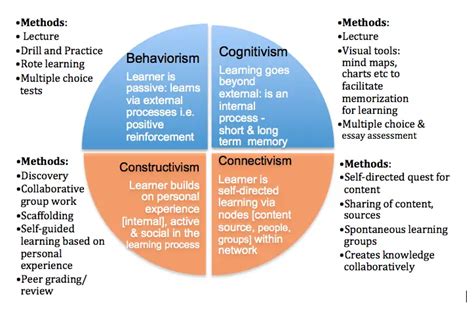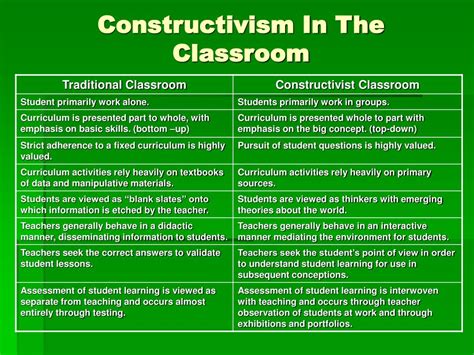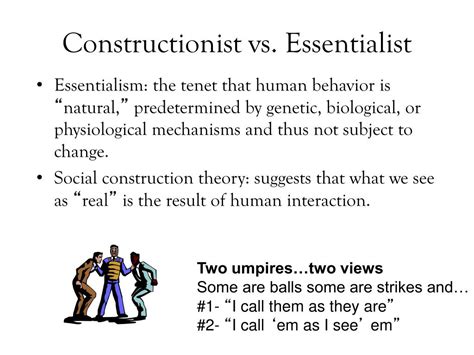When it comes to understanding human behavior, learning, and development, two prominent theories have been at the forefront of discussion: Essentialism and Constructivism. Essentialism posits that certain traits, abilities, or characteristics are innate, existing from birth, and are a fundamental part of who we are. On the other hand, Constructivism suggests that these traits are constructed through our experiences, interactions, and learning processes. In this article, we will delve into the nuances of these two theories, providing 5 essential tips that highlight their differences and implications in various contexts.
Key Points
- Understanding the foundational principles of Essentialism and Constructivism
- Recognizing the role of innate abilities versus learned behaviors
- Applying Essentialist and Constructivist perspectives in educational settings
- Considering the impact of societal and cultural constructs on individual development
- Integrating both theories for a more comprehensive understanding of human development
Essentialism: Understanding Innate Traits

Essentialism, in its purest form, suggests that humans are born with certain traits, abilities, or characteristics that define who they are. This theory can be seen in discussions around intelligence, personality, and even gender roles. For instance, the concept of intelligence quotient (IQ) has been a subject of debate, with some arguing that IQ is largely innate, while others suggest it can be significantly influenced by environmental factors. Essentialist perspectives often focus on the idea that these innate traits influence our behaviors, choices, and outcomes in life.
Critique and Application of Essentialism
While Essentialism provides insights into potential innate differences among individuals, it has faced criticism for potentially leading to determinism and overlooking the impact of environmental factors. In educational settings, an Essentialist approach might focus on identifying and nurturing innate talents, assuming that these are the areas where individuals will naturally excel. However, this approach risks neglecting the development of skills that are not deemed innate, potentially limiting an individual’s overall growth.
Constructivism: The Role of Experience and Learning

Constructivism offers a stark contrast to Essentialism by suggesting that our traits, abilities, and characteristics are constructed through our experiences, interactions, and learning processes. This theory emphasizes the role of environment, culture, and social interactions in shaping who we are and what we can become. Constructivists argue that knowledge and understanding are not acquired through passive reception but are actively constructed by the individual through experience and social interaction.
Implications of Constructivism
The Constructivist perspective has significant implications for education and personal development. It suggests that individuals are capable of learning and adapting throughout their lives, given the right conditions and support. This approach encourages a focus on creating rich, interactive learning environments that challenge individuals and facilitate their construction of knowledge and skills. However, Constructivism can also be criticized for potentially underestimating the role of innate abilities and overemphasizing the influence of external factors.
| Theory | Key Principles | Implications |
|---|---|---|
| Essentialism | Innate traits, deterministic view of development | Focus on identifying and nurturing innate talents, potential for determinism |
| Constructivism | Constructing knowledge through experience, emphasis on environment and learning | Focus on creating interactive learning environments, potential for overlooking innate abilities |

Integrating Essentialism and Constructivism
While Essentialism and Constructivism present seemingly contrasting views, they are not mutually exclusive. A more balanced approach recognizes that human development is influenced by both innate traits and environmental factors. This integrated perspective suggests that individuals are born with certain predispositions and abilities, but these are significantly shaped and developed through experiences, learning, and interactions. Such an approach can guide more effective educational strategies and personal development plans, acknowledging the complexity of human development.
Strategic Considerations for Integration
Integrating Essentialist and Constructivist perspectives requires a strategic approach that considers both the potential for innate abilities and the constructive role of experience and learning. In educational settings, this might involve initial assessments to identify areas of innate talent, followed by the provision of rich learning environments that challenge and support the development of these and other skills. Furthermore, acknowledging the role of societal and cultural constructs in shaping individual development can help in creating more inclusive and supportive environments for growth.
What are the primary differences between Essentialism and Constructivism?
+Essentialism posits that certain traits or abilities are innate, while Constructivism suggests that these are constructed through experience and learning. Essentialism focuses on the role of innate characteristics, whereas Constructivism emphasizes the impact of environment and social interactions.
How can Essentialism and Constructivism be applied in educational settings?
+An Essentialist approach in education might focus on identifying and nurturing innate talents, while a Constructivist approach emphasizes creating interactive learning environments that facilitate the construction of knowledge and skills. An integrated approach would acknowledge both perspectives, providing support for innate abilities while challenging individuals through experiential learning.
What are the implications of overlooking either Essentialist or Constructivist perspectives?
+Overlooking Essentialist perspectives might lead to underestimating the role of innate abilities, potentially neglecting areas where individuals have natural talent. Conversely, ignoring Constructivist perspectives could result in failing to provide the necessary environmental support and learning opportunities for development, leading to unrealized potential.
In conclusion, the debate between Essentialism and Constructivism highlights the complexity of human development, with both theories offering valuable insights into how we learn, grow, and understand the world around us. By integrating these perspectives, we can foster a more comprehensive approach to education and personal development, one that acknowledges both the potential for innate traits and the constructive power of experience and learning.
